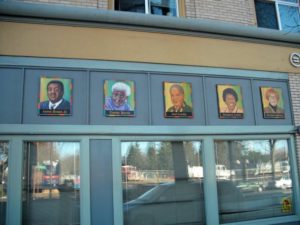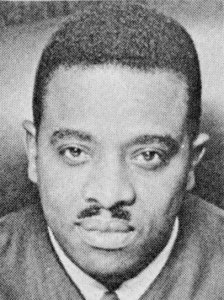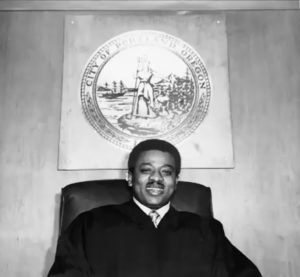“What’s up with the young Black lawyers?” Remembering Aaron Brown, Oregon’s first African American judge

Symone is Beneficial State Foundation’s Digital Engagement Manager based in Oakland, CA.
During Black History Month, we often hear stories about “firsts”—the first Black athlete to win an Olympic gold medal (John Baxter Taylor Jr.), the first Black woman to earn a college degree (Mary Jane Patterson), and other African Americans who have helped claim space for Black people in America. Their achievements are memorialized through storytelling, but the wisdom they personally drew from their experiences can easily get lost over the generations. Connecting with elders who have courageously broken barriers to advance the rights of African Americans is crucial for the generations who follow—and we recognize this importance, as demonstrated by the mantra that is popular in so many of our organizing spaces: we stand on the shoulders of our ancestors.
“I would like to be remembered as a person who wanted to be free…so other people would be also free.” – Rosa Parks
This recognition for the need to capture the wisdom of African Americans from previous generations is reflected in the current pop culture phenomena of “using storytelling to create change” (just as Black people have always played an important role in shaping American pop culture, we’ve also always used storytelling to pass on knowledge and preserve traditions) and numerous projects or archives that are dedicated to preserving Black history, such as the 2016 opening of the National Museum of African American History and Culture.
Last week, I had the privilege of chatting with Gregory Brown. Not only did Gregory work at Albina Community Bank as a Commercial Relationship Manager and CRA Officer for 10 years, but he also carries a deep legacy in his home state: his father, Judge Aaron Brown, was the first African American judge in the state of Oregon.
Beneficial State Bank recently completed its merger with Portland-based Albina Community Bank, a community bank founded to serve the needs of Albina neighborhood residents (a historically Black community) who were locked out of the financial system by the big banks. Albina Community Bank carries a deep history in the Portland Black community, and Gregory Brown is one of many characters from that storied, dynamic history.
The Life of Judge Aaron Brown
Gregory’s father, Judge Brown, was born on October 20, 1926 in Bell, Louisiana. He was the first-born child of Aaron Brown Sr. and Edna Mae Brown. The family moved to Houston, Texas when Judge Brown was 4 years old. Judge Brown’s father worked various jobs and his mother worked as a domestic worker to support their family of twelve. Growing up in Houston, Texas, Judge Brown was the eldest of ten kids and his family’s experiences with poverty informed his consciousness and the perspective that he would later bring into the courtroom. “He never forgot what he had to go through,” Gregory told me. This reverence for his roots was reflected in his chamber library, where books about African American history filled the shelves.
As a young adult, Judge Brown served in the U.S. army and then attended Fisk University, a historically Black university in Nashville. Motivated by his passion for breaking barriers, he decided to move to Portland to seek a career in law, and did social work during the day while attending Northwestern School of Law located in downtown Portland (Northwestern School of Law later merged with Lewis & Clark College and relocated to their SW Portland campus). Although ever-aware of the lack of representation of African Americans in law and medicine, he initially questioned which career to pursue. His commitment to increasing representation in the field by supporting Black law professionals would remain a constant thread in Judge Brown’s career, as he went on to mentor numerous young Black lawyers in the state.
His commitment to increasing representation in the field by supporting Black law professionals would remain a constant thread in Judge Brown’s career, as he went on to mentor numerous young Black lawyers in the state.
Judge Brown earned his law degree in 1959, passed the bar (he was the first Black member of the Multnomah Bar Association), and opened a law practice on North Williams Avenue in the building that is now home to a Black-owned funeral home. His old office is located a half block from the Urban League of Portland offices. His portrait hangs on the outside wall of the Urban League of Portland building alongside other figures who have made a historical impact or significant contributions, both nationally and locally, fighting to support civil rights and equity for Black people – an homage to his lasting legacy.
After practicing private law for 11 years, Judge Brown was appointed as pro tem judge by Mayor Terry Schrunk in 1969 (one year after the Fair Housing Act was signed). Mayor Schrunk later made the appointment permanent, and Judge Brown officially became Oregon’s first Black judge. In 1971, Governor Tom McCall appointed him to District Court.
Judge Brown successfully ran for re-election four times, facing opposition only once. He served twenty-five years on the bench, a remarkable feat for a Black judge in Oregon – a place where only a century earlier, government officials created a law to ban Black people from entering or living in the Oregon territory. Judge Brown retired in 1995, but continued to preside as a Circuit Court judge on an as needed basis in multiple Oregon counties for several more years.
Judge Brown’s Legacy: Uplifting Young Black Lawyers
The biggest takeaway from my conversation with Gregory? His father Judge Brown recognized the importance of supporting up-and-coming young Black lawyers and always wanted his finger on the pulse of the Black lawyer pipeline. Every Sunday, Gregory traditionally would call his parents who had relocated down to Holly Springs, Mississippi. His father would ask, “How are the young Black lawyers doing? What’s going on with the young Black lawyers?”
Over the years, Gregory (who still resides in Portland) would learn that his father mentored more Black lawyers in Oregon than he ever could have imagined. In 1974, Gregory left Portland to attend Florida A&M University down in Tallahassee, Florida. By the time he returned to Portland, some 19 years later, there were five Black judges serving on the bench in Portland. Everyone in law, regardless of their race, seemed to know about Judge Brown and they all respected Judge Brown for the work he did.
Everyone in law, regardless of their race, seemed to know about Judge Brown and they all respected Judge Brown for the work he did.
One day, Gregory received a call from his father with a request. He asked Gregory if he knew who Judge Adrienne Nelson was. Gregory informed him that he did not. His father stated: “I want you to track down Judge Nelson, who was recently appointed to the bench as the second Black female judge in the state of Oregon, and take her to lunch for me.” Gregory found Judge Nelson’s contact information and called her up. Over lunch, Judge Nelson shared stories about Judge Brown and expressed just how much his mentorship influenced her career path. When Judge Brown passed away in August 2016, Judge Nelson, as well as two other judges, provided commentary at his memorial services about his leadership in the law field. Not long after, Judge Nelson was appointed as the first African American judge to serve on Oregon’s Supreme Court.
Proving the Naysayers Wrong
Despite being the only Black person in many of the spaces he occupied, Judge Brown never spoke to his son about the challenges he faced as the first African American judge in Oregon. “He didn’t speak about them because he felt like nobody can stop you from doing what you want to do. Although racism existed, he never spoke about it as a roadblock against hard work and perseverance.”
Along with battling racist views from White people, Judge Brown also faced scrutiny from his peers in Portland’s African American community. “When you were the first, the assumption was that you were a sell-out,” Gregory told me. Some believed that if you were the first, you must have had to “step on somebody” to get to where you were at. As a young kid, Gregory initially heard these sentiments from a couple of his schoolmates. Years later, those very same people would tell Gregory that they appeared in front of his father for a court hearing —and that his father helped them out or gave them a break.
“They didn’t know that he wasn’t giving them a break—that’s just who he was. He was fair.”
Judge Brown always kept the future of Black lawyers in mind—he wanted to see more African Americans go into law. He had one mentee named Ancer Haggerty who he would meet for lunch, and on two separate occasions, he asked Ancer if he was ready to be a judge. The first time he replied “I don’t think I’m ready.” They met again a year later, and this time Haggerty answered “yes.” A few years later, after serving on the Multnomah County Circuit Court bench, Ancer L. Haggerty was nominated by President Bill Clinton and subsequently appointed to become Oregon’s first Black Federal judge.
If there is one thing that Gregory wants people to remember about his father, it’s that he cared about young people and mentored many young adults over the course of his life. One of Judge Brown’s best friends was the neighborhood barber, and Judge Brown often spent time in his barbershop “holding court” and sharing knowledge with young people in the neighborhood.
As Black millennials across our country today continue to organize for a better future, it is more important now than ever, that they turn to the experiences of previous generations to see how our “firsts” navigated the never-ending process of securing and protecting human rights. It’s an honor to preserve a piece of the Albina community’s legacy through the Brown family’s history.
This blog post reflects the author’s personal views and opinions, and does not represent the views and opinions of Beneficial State Bank and/or Beneficial State Foundation.





